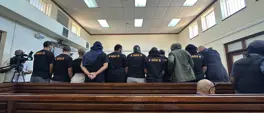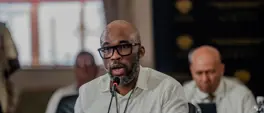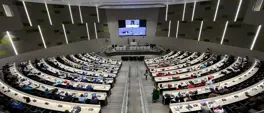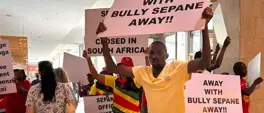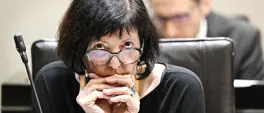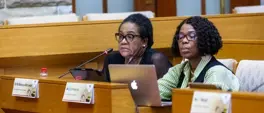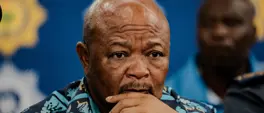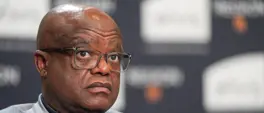Out of the black and into the red – Theewaterskloof municipality’s rapid decline
Steve Kretzmann, GroundUp
18 June 2025 | 10:31Rot set in straight after the 2021 local government elections.
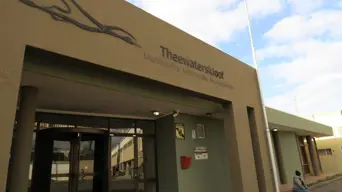
The Theewaterskloof Municipality’s offices in Plein Street, Caledon. A political power struggle since the 2021 local government elections has left the municipality without a majority party. Picture: Steve Kretzmann/GroundUp
Political instability and deepening financial distress have dogged the Theewaterskloof Local Municipality since the loss of a majority party in council and the formation of coalition governance following the November 2021 municipal elections.
This was in evidence at a council meeting in the municipality’s Caledon chambers on 29 May while voting on whether 24 agenda items related to irregular, and fruitless and wasteful expenditure in the 2022/23 financial year should be referred to the provincial government for investigation. This would be done by invoking Section 106 of the Municipal Systems Act, which calls for the provincial MEC for local government to investigate the possibility of fraud, corruption, maladministration or nepotism.
There were heated arguments from councillors from the ANC and Patriotic Alliance (PA), who are the main parties in opposition to the current DA/GOOD/Social Revolutionary Workers Party (SRWP) coalition. The opposition councillors, the most vocal of whom was the ANC’s Derick Appel, argued the items should be dealt with internally. Appel claimed irregular expenditure to white-owned businesses, such as ASLA Construction, was being written off with the finding that value for money had nonetheless been obtained, while irregular expenditure that benefited black-owned businesses was being investigated.
Mayor Lincoln de Bruyn (DA) – in the seat after the fifth change since November 2021 – said a “thorough investigation” of the items was needed, and once findings had been made, the officials responsible could be made to reimburse the municipality according to the provisions of the Municipal Finance Management Act.
The vote on a forensic investigation of the items hinged on the DA/GOOD/SRWP alliance’s one-seat majority of 14 seats in the 27-seat council. The coalition held on the day, and the vote went through.
An additional benefit for the cash-strapped municipality, said current municipal manager Walter Hendricks, was that an investigation through section 106 would be funded by the province not the municipality.
POLITICAL FLIP-FLOPS
While the GOOD party stood fast in its latest alignment with the DA, this has not always been the case. GOOD’s wavering has been an Achilles heel for stable governance in the municipality since November 2021.
Between the 2016 and 2021 local government elections, the DA held a slim 51% majority with 14 seats, obtaining unqualified audits from the Auditor-General.
The DA, with Christelle Vosloo as mayor, lost its majority in the 2021 elections, falling to 42%, with the ANC at 29% and GOOD at 10%. The ANC’s alignment with the PA and the EFF only provided 11 seats, with 14 needed for a majority. GOOD brought its three seats to the ANC coalition, putting PA councillor Karel Papier in the mayoral seat, and appointing the ANC’s Derick Appel as Speaker. Following Papier’s death in 2023, the continuing ANC alliance with GOOD and the PA put the PA’s Mary Liebenberg in the mayoral seat.
A year later, in August 2024, GOOD turned its back on the ANC-led alliance and backed the DA to oust Appel and elect its councillor, John Michels, as Speaker, with the DA’s Lincoln de Bruyn as mayor.
But just two weeks later, the three GOOD councillors betrayed their new alliance with the DA and the one-seat SRWP, and backed an ANC-led motion of no confidence to oust de Bruyn. In a politically bizarre move, the FF+ joined in, together with the EFF, resulting in FF+ councillor Tienie Zimmerman being elected mayor.
The unlikely coalition did not hold. As reported in the Daily Maverick, GOOD stripped the three councillors of their party membership for failing to adhere to the coalition agreement that had been reached with the DA and the SRWP. As Speaker, John Michels was replaced by Welldon Wells from GOOD, whose three seats are due to proportional representation rather than wards, meaning there was no need for by-elections.
Zimmerman’s position as mayor did not survive a subsequent legal challenge. The Western Cape High Court reinstated De Bruyn in November 2024. He has since led the coalition with the new GOOD councillors and SRWP alliance to date.
FINANCIAL MISMANAGEMENT
The political instability is reflected in the municipality’s financial reports. Auditor-General reports going back to the 2014/15 financial year reveal Theewaterskloof received unqualified audits right up to the 2021/22 financial year. Irregular, and fruitless and wasteful expenditure was low, less than R1-million, except for 2017/18 when irregular expenditure went up to R18-million. Irregular expenditure then shot up to R101-million in 2018/19, with the Auditor-General warning of repeat supply chain management issues, although the audit was unqualified. There was no unauthorised expenditure reported by the Auditor-General between the 2016 and 2021 municipal election period, but this changed immediately thereafter.
In the 2022/23 financial year – the first full financial year after the local elections – unauthorised expenditure amounted to R104-million under the ANC/PA/GOOD coalition. That audit was unqualified but deteriorated to a qualified audit during the 2023/24 financial year under the continued ANC-led coalition and a PA mayoral seat.
Irregular expenditure rose to R262-million (more than double the 2018/19 blip), with R49-million in unauthorised expenditure. Additionally, the Auditor-General said the municipality was “non-compliant with legislation”.
The Auditor-General report further noted that within two years, the municipality slid from financial stability to being essentially bankrupt.
“A material uncertainty exists that may cast significant doubt on the municipality’s ability to continue as a going concern,” stated the Auditor-General in the report on the 2023/24 audit.
Regarding the irregular expenditure (R262-million) and unauthorised expenditure (R49-million), the Auditor-General said the municipality had not investigated liability for this expenditure, though this was required by law. Further, no “reasonable steps” had been taken to prevent irregular expenditure, most of which was caused by non-compliance with supply chain management regulations.
According to senior municipal officials, the municipality’s Municipal Public Accounts Committee (MPAC) which would examine these matters and make proposals to council, hadn’t met in three years, until after the DA-led coalition took charge.
According to current municipal manager Walter Hendricks, the Directorate for Priority Crime Investigation (the Hawks) is investigating what happened to R41-million in disaster relief supplied to the municipality following floods in late September 2023.
The Auditor-General’s office states there are no records of how it was spent.
Wilfred Solomons-Johannes, who was acting municipal manager at the time, has been suspended from his current post as director of community services while the investigation takes place.
The 2024/25 audit report is not yet available but Hendricks told GroundUp irregular expenditure was at about R350-million.
The financial mismanagement resulted in the MEC for local government in November invoking Section 139 of the Constitution and putting the municipality under financial administration. This means the municipality has to work with provincial and National Treasury officials to develop a financial recovery plan.
Get the whole picture 💡
Take a look at the topic timeline for all related articles.


